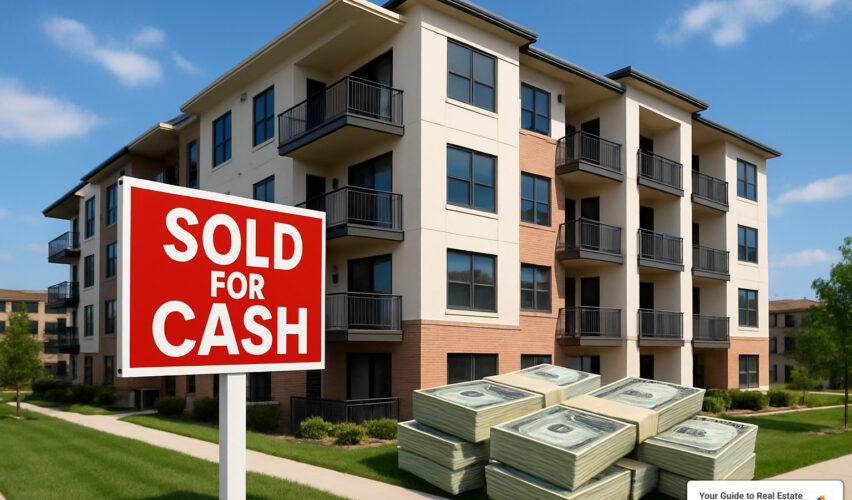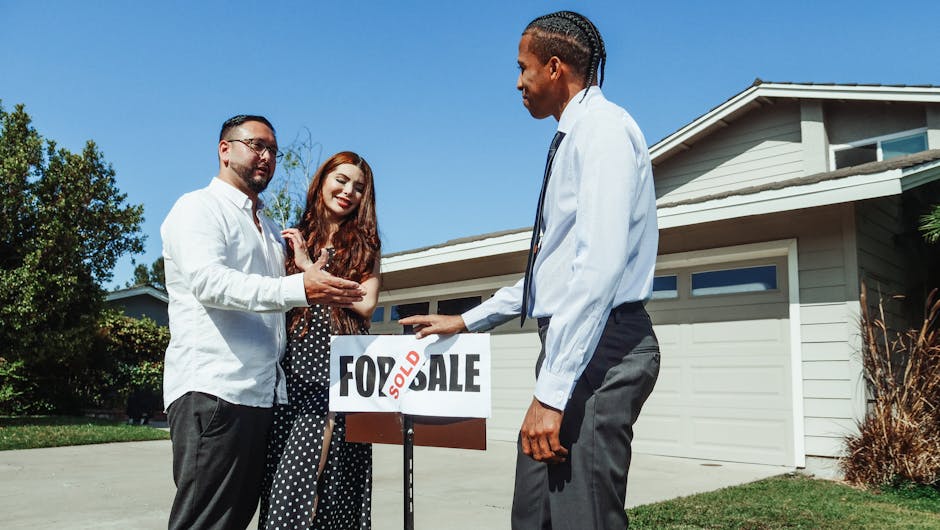Why Selling Your Condo for Cash Makes Sense in Today’s Market
Roughly 30 % of U.S. homes now close without a mortgage, and condos lead that shift. When you need speed or simplicity, a cash deal can turn months of uncertainty into a predictable, two-week transaction.
Quick-sale highlights
- Close in 7–14 days
- Sell as-is – no repairs or staging
- No open houses or daily showings
- Guaranteed closing (no loan contingency)
- Pick your exact move-out date
Trade-offs
- Cash buyers typically pay 70-95 % of market value
- Smaller buyer pool
- You must verify proof of funds and reputation
Because lenders aren’t involved, cash buyers skip HOA questionnaires and appraisals that often derail financed condo deals. If you’re relocating, inheriting a unit you don’t want, or racing a foreclosure clock, understanding this option helps you act with confidence.

What You’ll Learn
This guide covers the benefits, risks, step-by-step process, offer comparison tools, and scam-avoidance tips you need to evaluate cash offers like a pro.
Why Consider a Fast Cash Sale for Your Condo
Traditional condo sales stall on HOA paperwork, appraisals, and buyer financing. Cash buyers cut through those problems, letting you close in days instead of months.
Advantages
- No appraisal surprises
- Flexible closing date—10 days or 60 days, your choice
- Skip staging and constant showings
- No financing contingency
Costs to Weigh
- Study after study (see latest research on cash discounts) shows a ~10 % discount versus financed buyers
- Smaller buyer pool
- Standard HOA transfer fees still apply
Who Buys for Cash?
- Local investors building rental portfolios (fastest, lowest offers)
- Renovation flippers (mid-range offers)
- iBuyers charging 5–6 % service fees
- Individual owner-occupants paying closest to market value
If you’ve inherited a condo, must relocate quickly, or want a clean break during a divorce, the certainty of cash often outweighs the higher price of an MLS listing.
Step-by-Step: How to Sell Condo for Cash

Our proven process helps you steer cash sales efficiently while protecting your interests. Follow these steps to maximize your proceeds and avoid common pitfalls.
For detailed property valuation guidance, check out our valuation and market analysis resource.
1. Determine Market Value & Set Goals
Start with a Comparative Market Analysis (CMA) of recent sales in your building, then nearby complexes. If comps are thin or your unit is unique, spend $400–$600 on a professional appraisal—it’s cheap leverage in negotiations.
Calculate two key numbers:
- After-Repair Value (ARV): what the condo could fetch in top condition.
- Minimum Net Proceeds: what you must walk away with after mortgage, HOA fees, and closing costs.
Having these figures on paper lets you judge every cash offer quickly and objectively.
2. Find and Vet Buyers
Reputable buyers supply recent bank statements or a verified proof-of-funds letter—no excuses. Check the Better Business Bureau, ask for two past-seller references, and confirm the buyer’s name in county property records.
Red flags
- Up-front fees
- Pressure to sign immediately
- Proof of funds older than 30 days or screenshot images that can be doctored
Networking with local agents, attorneys, and online investor platforms usually produces several solid buyers within a few days.
For more guidance on selling your condo, visit our sell my condo resource page.
3. Prepare Your Condo & HOA Docs to Sell Condo for Cash

Gather everything buyers and the closing company will need before you accept an offer:
- HOA bylaws, CC&Rs, and current budget
- Reserve study and last three board-meeting minutes
- Estoppel or resale certificate confirming dues status & assessments
- State-required disclosure form and any recent inspection reports
Having this packet ready proves you’re a low-risk, ready-to-close seller and often shortens closing to under two weeks.
4. Compare Offers & Negotiate Terms
Build a quick spreadsheet for each offer:
- Offer price
- Minus your closing costs and HOA fees
- Plus savings on repairs and three months of carrying costs you’d spend listing on the MLS
- Timeline to close
- Earnest money (1–3 % is typical)
- Inspection or assignment clauses that could let the buyer renegotiate
A slightly lower offer with higher earnest money and a 10-day close often nets more than a higher-price offer with delays and contingencies.
5. Close the Deal: Paperwork Needed to Sell Condo for Cash
You’re almost at the finish line! The closing process for a cash condo sale is typically smoother than traditional sales, but there are still important documents and steps to handle properly.
The purchase contract forms the foundation of your sale. Even though cash buyers often present their own contracts, it’s smart to have a real estate attorney or experienced agent review every detail before you sign. This small investment protects you from potentially costly oversights or unfavorable terms that could come back to haunt you later.
Your title search and insurance might seem unnecessary in a cash deal, but they’re actually crucial protection. A licensed title company will verify that you legally own the property and can transfer it without any liens or ownership disputes. Think of it as insurance for both you and the buyer – nobody wants surprises after the money changes hands.
HOA transfer requirements can be the trickiest part of closing a condo sale. Every association has different rules, but you’ll typically need to pay document preparation fees, transfer taxes, and sometimes new owner approval costs. These expenses usually range from $500 to $1,500, so budget accordingly. Your HOA management company can provide a detailed breakdown of required fees and timelines.
The deed transfer is the moment when ownership officially changes hands. Your title company handles the technical aspects, including recording the new deed with the county. Before signing anything, double-check that all names are spelled correctly and the legal property description matches your original deed. Small errors here can create big headaches later.
Most cash closings happen within 7 to 14 days once all paperwork is ready. The beauty of sell condo for cash transactions is that you won’t be waiting for loan approvals or dealing with last-minute financing issues that can derail traditional sales.
Your title company will coordinate the final walkthrough, fund transfer, and key exchange. On closing day, you’ll sign the deed, receive your proceeds, and officially hand over your condo to its new owner.
Evaluating & Comparing Cash Offers

When you total holding costs, repair expenses, and agent commissions, a cash offer at 90 % of market value can equal—or beat—a traditional sale that drags on.
Metrics that matter
- Net proceeds after all costs
- Time value of money (cash today vs. maybe more later)
- Risk the deal falls through
A simple spreadsheet and a 30-minute attorney review are your best tools for choosing the right offer.
Avoiding Risks and Scams in Condo Cash Sales
Unfortunately, distressed sellers often become targets for sophisticated scams. According to research from Bankrate on real estate fraud, common schemes include deed fraud, bait-and-switch tactics, and email phishing for personal information.
Bait-and-Switch: Buyers make attractive initial offers, then find “problems” during inspection to dramatically reduce the price. Protect yourself by getting offers in writing with limited inspection periods.
Deed Fraud: Scammers try to get you to sign over your deed before payment. Never transfer ownership without simultaneous payment through a licensed escrow company.
Email Phishing: Fake buyers request detailed financial information or ask for upfront fees. Legitimate cash buyers never require payment from sellers.
Hidden Assignment Clauses: Some contracts allow buyers to assign the deal to other investors without your knowledge, potentially creating complications at closing.
Due-Diligence Checklist
Verify Identity: Ask for government-issued ID and confirm the buyer’s legal name matches their proof of funds.
Confirm Funds: Request recent bank statements or verification letters from financial institutions. Don’t accept screenshots or easily manipulated documents.
Use Escrow: Insist on using a licensed title company or attorney for closing. Never close with the buyer’s preferred “closing company” without verifying their credentials.
Consult a Lawyer: Have a real estate attorney review any contract before signing. This small investment protects against costly mistakes.

Alternatives to Selling Your Condo for Cash
Cash works when you need certainty, but other routes can net more if you have time:
- Full-service agent: highest prices, 55–70 day timeline, 5–6 % commission
- Flat-fee MLS / FSBO: save commission but handle showings and paperwork
- Keep and rent: long-term income if HOA allows rentals
- Cash-out refinance: pull equity while keeping the property (see Cash-Out Refinancing Explained)
- Lease-back or rent-to-own: liquidity plus a place to stay
Traditional listings usually win in a seller’s market, for turnkey units, or when you can wait a few months.
Frequently Asked Questions about Fast Cash Condo Sales
How much do cash buyers typically pay for condos?
The price you’ll receive depends largely on your condo’s condition and the type of buyer you’re working with. Cash buyers who plan to flip properties typically offer 50-70% of market value for condos needing significant work, factoring in renovation costs and their profit margins.
If you’re working with iBuyer companies, expect offers around 85-95% of market value, but remember they’ll charge 5-6% service fees that reduce your net proceeds. Individual cash buyers often land somewhere in the middle, paying 70-85% of market value for move-in ready properties.
Your condo’s location plays a huge role too. Properties in desirable areas with strong rental markets often command higher cash offers because investors see better long-term potential. The buyer’s intended use also matters – investors planning to rent your unit typically pay more than flippers who need room for renovation profits.
Can I sell my condo as-is without repairs?
This is one of the biggest advantages when you sell condo for cash – you can absolutely sell in current condition without making any improvements. Cash buyers expect to handle repairs, renovations, and updates themselves, which is often built into their offer price.
You’ll still need to be honest about any known problems though. State disclosure laws require you to reveal material defects you’re aware of, even in as-is sales. Being upfront about issues actually builds trust with buyers and prevents last-minute surprises that could derail your closing.
Think of it this way: cash buyers are professionals who’ve seen it all. They’d rather know about that leaky faucet or outdated electrical panel upfront than find it during their walkthrough. Transparency keeps the process smooth and fast.
What fees should I expect in a cash sale?
Cash sales are refreshingly simple when it comes to fees. Unlike traditional sales where you might pay 6-10% of the sale price in various costs, cash transactions typically involve minimal seller expenses.
Your main costs will be HOA-related fees ranging from $200-800, covering document preparation and transfer requirements. Most associations charge for preparing resale packages and processing new owner applications, even in cash sales.
If you hire a real estate attorney for contract review – which we strongly recommend – budget $500-1,500 for legal fees. This small investment protects you from costly mistakes and ensures all paperwork is handled correctly.
You’ll also need to settle any outstanding HOA dues and special assessments before closing. The good news? Most cash buyers cover title insurance, escrow fees, and other standard closing costs themselves, making this one of the most cost-effective ways to sell your condo.
Conclusion
Cash condo sales trade a portion of price for speed and certainty. If repairs, HOA problems, or an urgent timeline weigh on you, a verified cash buyer who closes in 10 days can be the simplest path forward. If your unit is updated and you can wait, the MLS may still put more money in your pocket.
Whatever route you choose, protect yourself: know your numbers, verify proof of funds, and have a professional review the contract. For deeper dives into every selling option, explore our The Ultimate Guide to Selling Your Home: Tips, Timelines, and Tools.





















